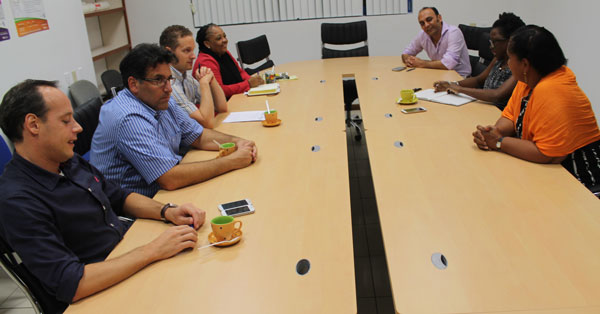 GREAT BAY (DCOMM):--- The Collective Preventive Services (CPS), a government department under the Ministry of Public Health, Social Development and Labour, recently coordinated a meeting with medical professionals that included gynecologists, a pediatrician, internists and representatives from the St. Maarten Laboratory Services (SLS) with respect to guidelines on how to deal with the Zika (ZikV) mosquito-borne virus.
GREAT BAY (DCOMM):--- The Collective Preventive Services (CPS), a government department under the Ministry of Public Health, Social Development and Labour, recently coordinated a meeting with medical professionals that included gynecologists, a pediatrician, internists and representatives from the St. Maarten Laboratory Services (SLS) with respect to guidelines on how to deal with the Zika (ZikV) mosquito-borne virus.
CPS was informed with respect to testing mechanisms that are in place and whether any additional assistance would be needed.
The discussion was conducted within the following consideration at the time: There is a lack of scientific evidence that ZikV causes microcephaly; There is not sufficient evidence that ZikV causes Guillian Barre Syndrome or other Neurological disorders; There is no scientific data to establish a clear correlation between ZikV and genetic abnormalities; All the literature indicate that there might be an association but to what extent still needs to be established and confirmed.
The advice is to only communicate the facts and eliminate the emotional aspects in what is communicated. The facts should be provided until otherwise scientifically proven.
There was also a discussion among the health care professionals with respect to a possible link between microcephaly and ZikV. During the first trimester of pregnancy, viral testing is already part of the examination that is conducted as part of the intake process of a pregnant woman.
During pregnancy, General Practitioners (GP) normally request viral lab testing; they will add ZikV to the list. This way any pregnant women suspected of ZikV that fit the case definition will be tested. When a pregnant woman is confirmed for ZikV by the GP, she will be referred to the gynecologists for specialized attention and further monitoring.
Pregnant women have the same risk as the rest of the population of being infected with ZikV, which is transmitted by the bite of infected Aedes mosquitoes. Many women may remain unaware that they have the virus, as they may not develop any symptoms. Only one in five people infected with ZikV develops symptoms, and in those with symptoms the illness is usually mild.
The most common symptoms are slight fever and exantema, or rash. Other symptoms related to ZikV are conjunctivitis, muscle and joint pain, and general malaise, which begins two to seven days after the bite of an infected mosquito.
Everyone, including pregnant women and women of childbearing age, should avoid exposure to mosquito bites, for example, by wearing long sleeves and long pants, using insecticide-treated mosquito nets and using insect repellents.
Public health authorities also emphasize the need to follow instructions on the label when using repellent. In every home and its surroundings, it is very important to identify and eliminate potential mosquito breeding sites.
ZikV is a member of the Flaviviridae family and is transmitted to humans by mosquitoes. It is related to other pathogenic vector borne flaviviruses including dengue, chickungunya, West-Nile and Japanese encephalitis viruses but produces a comparatively mild disease in humans.
An increase in the mosquito population puts residents and visitors at risk. Take measures by avoiding being bitten by a mosquito. For information about Dengue fever, ZikV and Chikungunya prevention measures, you can call CPS 542-2078 or 542-3003.









